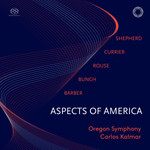|
Back
09/23/2018
"Aspects of America"
Sean Shepherd: Magiya
Sebastian Currier: Microsymph
Christopher Rouse: Supplica
Kenji Bunch: Aspects of an Elephant
Samuel Barber: Souvenirs, opus 28
Oregon Symphony, Carlos Kalmar (conductor)
Recording: Arlene Schnitzer Concert Hall, Portland, Oregon (2016, 2017) – 75’26
Pentatone PTC 5186 727 (Distributed by Naxos of America) – Booklet in English

   
Carlos Kalmar and the Oregon Symphony have released a steady string of impressive recordings on Pentatone, notable for the acuity of the orchestra’s playing and Kalmar’s probing, convincing interpretations. I raved about their UK Collection (“This England”) and a Houston Symphony concert featuring works juxtaposing Spanish (de Falla, Rodrigo) and Argentinian (Ginastera) works with Haydn’s not-so-known Symphony No. 37. There is no doubt that he is an effective conductor, and his aptitude for electrifying performances of colorful, rhythmic scores is everywhere in evidence on the present release.
“Aspects of America” is the second all-USA disc from these artists. 2015’s “Spirit of the American Range” checked mainstays Walter Piston, George Antheil, and Aaron Copland off the list. Charles Ives and John Adams are included (among British male composers) on another disc, “Music for a Time of War.” To these, we can now add Samuel Barber and four already-accomplished living American men (Sean Shepherd, Sebastian Currier, Christopher Rouse, Kenji Bunch.) Thus we have three discs with ten American works on them, all by male composers.
It is inexcusable and, frankly, hard to believe that Pentatone and/or Kalmar didn’t bother to seek out a piece by a female composer on any disc released to date. There are many, many American and British women who have and are writing music equal to the works presented on any of these discs. The orchestra’s 2018-2019 season is moving in microscopic steps to correct this glaring inequity in programming, including two works by female composers (Katherine Balch and Unsuk Chin.) One expects that more commissions, performances, and several recordings in a similar vein are in the works.
Kenji Bunch—a Portland native—wrote his charmingly clever Aspects of an Elephant specifically for the Oregon Symphony. The piece is structured as a modified Theme and Variations, and one may think of the type of character variations found in Britten’s Frank Bridge set. Here, Bunch creates six variations that represent various descriptions of the eponymous pachyderm as drawn from the parable of the “Blind Men and the Elephant.” The piece is thoroughly convincing, and, as a miniature concerto for orchestra, lets small chamber groups from orchestra shine in each small variations. The culminating Finale (“The Creature Revealed”) is beautiful, Copland-esque apotheosis.
Bunch’s work features much exotic percussion, and that seems to be the norm for all the new works on the disc. I’ve been consistently impressed with Sean Shepherd’s orchestral works, including his magnificent 2009 piece, Wanderlust, which I had on repeat for a good while and return to often. His brief, colorful Magiya, is an effective concert opener, though I feel it’s not quite as consistent as his other works. The spirit of Dutilleux hovers strongly over the music, but the lack of any true polyphony and a clear sense of pulse and downbeat moves is squarely to a more academic American aesthetic. Every rhythmic gesture is doubled by some kind of percussion instrument, and listeners attracted to constant rattles and shakes will certainly enjoy the ride.
In his Microsymph, Sebastian Currier seems to want to outdo Schoenberg’s First Chamber Symphony, packing the content of a “large-scale five movement symphony...into only ten [sic] minutes.” The result is certainly frantic, verging on manic, but the structure doesn’t seem to convince as well as Schoenberg’s.
Likewise, Christopher Rouse’s Supplica falls prey to some tropes the composer has done better in other works. Known for his brash orchestral showpieces based on Greek mythology, Supplica abandons the extroversion for a subtler approach. It is an effective essay, if perhaps overly long. One can find this perspective more convincingly expressed in the masterful, elegiac finale to his Trombone Concerto or second movement of his Second Symphony. The unique sonic world Supplica—lacking woodwinds and percussion—gives it a distinctive memorability among the other heavily-percussed new works.
The only piece that allows for interpretive comparison is Barber’s Souvenirs, and the present reading of the orchestral ballet version certainly holds its own among others. The various dance rhythms are pointed up nicely by Kalmar, giving the "Waltz", "Pas de deux", and "Hesitation-Tango" an especially memorable lilt that stands out among a small but distinctive group of interpretations.
In the end, this is a frustrating release. Despite its lack of visionary programming, the orchestral playing and recording are superlative. I’d recommend, however, that buyers look to support projects that offer more accurately representative “Aspects of America.”
Marcus Karl Maroney
|